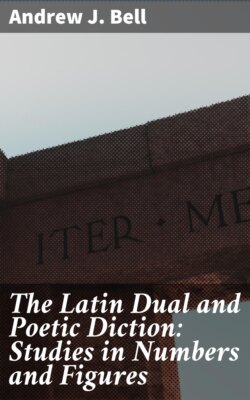Читать книгу The Latin Dual and Poetic Diction: Studies in Numbers and Figures - Andrew J. Bell - Страница 8
На сайте Литреса книга снята с продажи.
IV
LIBERI
ОглавлениеTable of Contents
That geminus Pollux could be used for gemini Castores or Polluces will seem easier to believe, when we see how liberi is used in Latin for a single son or daughter, and how far this use has been extended by analogy. We have here the opposite of the use of one for two, an opposite which we find as a rule in case of any abnormal construction. We read in the third Aeneid:
Idem (nos) venturos tollemus in astra nepotes
Imperiumque urbi dabimus. (vv. 158-9.)
Servius’s note to this is: In astra nepotes significat Gaium Iulium Caesarem, qui primus inter deos relatus est. He evidently refers nepotes to Caesar as founder of the Empire; otherwise he would have taken note of Romulus.
The construction plainly starts with liberi, as we find it in: ex Miseno autem eius ipsius liberos ... a praedonibus esse sublatos (Cic. Leg. Man. 33. 12). Plutarch tells us that it was a daughter of Antonius that was carried off (Pomp. 24). So in: occisus est cum liberis M. Fulvius consularis (Cic. Cat. 1. 4.2), and: cum Ameriae Sex. Rosci domus, uxor, liberique essent (Pro Rosc. Am. 96. 34), liberi is for a single son; and in: coniugem et liberos meos (Tac. Ann. 1. 42.2) Caligula is the only child of Germanicus in the camp. In: et Plancinam et filios variis modis criminari (Ann. 2. 57.3) M. Piso is the only son with his father in Syria. Here it is extended from liberi to filii, as in: vagamur egentes cum coniugibus et liberis (Cic. Att. 8. 2.3), where coniugibus (i.e. Terentia) is evidently attracted to the plural by the following liberis; as is parentibus in: quod me parentibus (i.e. Antonia), liberis, patriae intra iuventam praematuro exitio raperent (Tac. Ann. 2. 71.2).
In: coniugiumque domumque patres natosque videbit (Aen. 2. 579) we remember that Helen had only one child, her daughter Hermione. About patres there seems more uncertainty among scholars; it may be for Tyndareus alone or for Tyndareus and a second consort; and so a plural for a dual, like soceros (v.457). But it seems most natural to take patres natosque here as a concrete expression for ‘the delights of home’, to put it more familiarly, ‘papa and the children’; in which case patres is for Menelaus and is attracted by natos like parentibus in the last example. Coniugium and patres, the first words of each colon, should have a common reference. To this class of plurals will belong amores in: Acmen Septimius suos amores (Catull. 45.1), Pompeius nostri amores (Cic. Att. 2. 19.2), non ille oblitus amorum (Aen. 5. 334). Draeger has referred this syntax to the general or typical use of the plural, as we find it in: et maribus Curiis et decantata Camillis (Hor. Ep. 1. 1. 64) ‘chanted by manly Romans of old like Curius and Camillus’. But all cases we have cited thus far are plainly of individuals, and not typical. It is easy to see how from such cases we pass to typical uses; from:
Qui illum decrerunt dignum suos quoi liberos committerent (Ter. Hec. 212),
where one child is vaguely referred to, it is easy to pass to:
Domus, uxor, liberi inventi invito patre. (And. 891.)
So in:
mussat rex ipse Latinus
Quos generos vocet aut quae sese ad foedera flectat (Aen. 12. 657-8)
Virgil transfers the plural generi from the leaders to their peoples, a transference easy in case of the Aeneadae, who are viewed as the family of Aeneas. We have a further step in: aut ensem ... ereptum reddi Turno, et vim crescere victis (Aen. 12. 799), where the plural is not now a collective, but an abstract designating the class to which Turnus belongs. This is the natural course in language; from the concrete we get the collective, and from this the abstract or general use, but by far the greater number of uses like liberi for a single son or daughter are concrete and of individuals.
That liberi is found only in the plural is no sufficient answer to our problem; the singular of liberi is in use in Liber Bacchus and in Libera Proserpina (cf. Κόρη Περσεφόνη). The real solution may be that given by Gaius: non est sine liberis, cui vel unus filius unave filia est (de Verb. Signif.1, cited by Gesner). So by a facile popular logic we have liberi used for either unus filius or for una filia, as we have seen.
